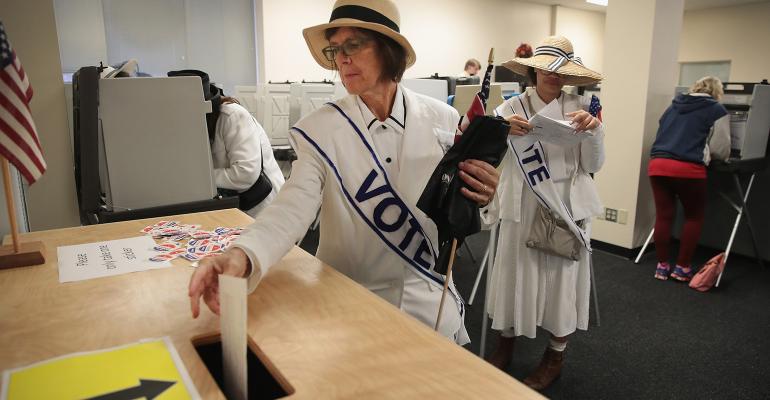The outcome of the upcoming elections could have a major impact on markets here in the United States. Advisors can help their clients get ahead of a potential change by educating themselves on different Congressional scenarios and how clients’ portfolios might be affected when Nov. 7 rolls around.
The EventShares U.S. Policy Alpha ETF (PLCY), which invests based on policy catalysts, may be a good proxy. The firm’s base case—and the consensus view of how things will likely to turn out—is that the House of Representatives flips to the Democrats, while Republicans hold the Senate.
Under that scenario, Chief Investment Officer Ben Phillips said he would make minimal changes to the fund’s holdings, which includes financials, defense, energy and education stocks. But he would also look to add a small allocation to infrastructure, as there’s been bipartisan support for it.
He suggests getting exposure through project managers, such as Fluor Corporation, KBR, and Granite Construction. Raw materials providers, including Martin Marietta and Vulcan Materials, is another way to play infrastructure.
[etf fund:PLCY]
“Both Trump and Hillary ran on infrastructure spending,” Phillips said. “A lot of Democrats ran on infrastructure spending. There’s a keen awareness in the country that there’s a need for infrastructure investments, and now it’s just getting the policy ball rolling there, if you will.”
If we see a “blue wave,” so to speak, where the Democrats take both houses of Congress, Phillips said he would look more at government agencies, because the policies at that level are more executive-lead. He would also look more at state legislation and other executive actions, such as trade.
In a blue wave scenario, he would also get a little more defensive, as a little pullback would be expected. As far as the pullback in the markets this week, Phillips said investors may already be starting to price in the potential for a blue wave.
“Our thought was that if there was a blue wave, there’d be a little pullback in the market as people reassess the potential for continued policymaking coming out of the Whitehouse, if maybe Congress together jointly between the House and the Senate starts trying to block certain efforts or get more involved in trade.”
If Republicans hold both houses, Phillips would stay in financials; he would look not just at banks, but at non-traditional lenders, such as Curo, Enova, FirstCash and Green Dot. He cites moves by the Consumer Financial Protection Bureau to reduce regulations on specific non-traditional lenders.
In the education sector, he would look to student lenders and for-profit colleges, such as Adtalem Global Education.
The most positive outcome for investors, Phillips believes, would be the status quo or the House flipping to the Democrats.
To construct the exchange traded fund, EventShares looks at the top 20 policy themes and then weights them by the conviction of those policies playing out. The largest theme of the portfolio currently is deregulation, split between financial deregulation (15 percent of the portfolio) and other (10 percent), which is primarily energy and education. Healthcare is the second theme (21 percent), with Obamacare policy tailwinds driving certain stocks. Defense spending, which Phillips expects will continue even if the House flips, accounts for 20 percent of the portfolio.
Twenty-two percent of the portfolio includes other one-off policy catalysts, such as trade, minimum wage, and “logistics tightness,” driven by regulations imposed by the Department of Transportation that impacted global supply chains.
Those rules forced some supply chain companies to raise fees, just as trade disputes are making supply chains costlier. Investors can get exposure to the logistics tightness via intermodal companies, such as Norfolk Southern and JB Hunt. Third-party logistics companies such as Echo Global Logistics and Hub Group are another way to play it. Phillips also likes specialized trucking companies, like Daseke, a micro-cap stock.
“It’s a combination of U.S. growth going hot plus trade disruptions slowing things down and jamming things up, so logistics are even more important.”

